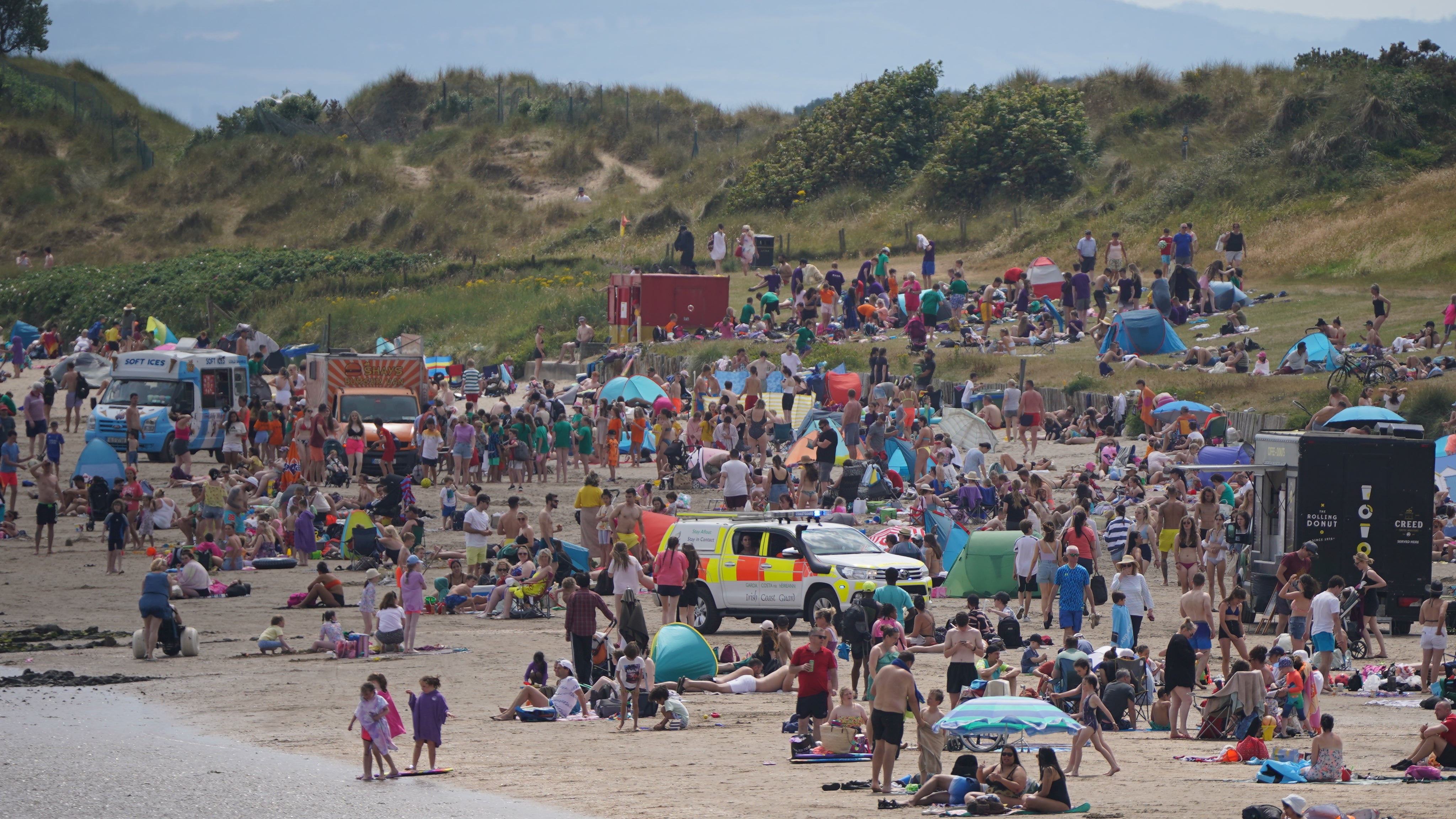Temperatures climb to high 30s as heatwave puts pressure on services
The mercury had hit 38.1C in Santon Downham, Suffolk, by 4pm.

Temperatures have topped 38C in the heatwave, as train services are cut, schools closed and ambulance crews face rising numbers of 999 calls.
The mercury had hit 38.1C in Santon Downham, Suffolk, by 4pm, making it the hottest day of the year, and temperatures topped 37C in a number of other places.
The Met Office was forecasting temperatures could break the existing UK record, of 38.7C, recorded in Cambridge in 2019, on Monday.
Or it will almost certainly fall on Tuesday, when temperatures could reach a “crazy” 41C in Yorkshire and Lincolnshire.
Wales has already provisionally recorded its hottest day on record, with the temperature reaching 37.1C Hawarden in Flintshire, beating the previous record for the country which has been in place since 1990 by almost 2C.
On Tuesday, Scotland is expected to see its hottest day on record.
The Met Office is also warning that temperatures overnight into Tuesday are holding up in the low to mid 20s in some places, and it looks likely to be the warmest night on record in the UK.
Met Office meteorologist Luke Miall said: “For a good part of eastern Wales, and England and southern Scotland, we’re looking at the 30s if not the high 30s.”
He added that London could see temperatures hit 40C.
He said: “I’ve been a qualified meteorologist for 10 years, and telling people about 41C in the UK doesn’t seem real.
“It’s crazy how we are talking about these sorts of values, I’ve never seen the models coming up with these values.
“It’s been quite an eye-opener to climate change with all these temperatures in the UK.”
Climate change, which has pushed up global temperatures by 1.2C on pre-industrial levels, is making heatwaves longer, more intense and more likely.
Experts have warned of the need to adapt homes, cities and infrastructure in the UK for a future of more intense summer heat.
Hot air from Europe is contributing to the extreme heat in Britain, with a searing heatwave baking much of the continent, fuelling fierce wildfires in France and Spain.
The UK Health Security Agency has issued a level 4 heat-health alert – described as an “emergency” – and the UK is under its first red extreme heat warning for a large part of England, issued by the Met Office.
The Government has held another emergency Cobra meeting to discuss the response to the heat, but opposition politicians have criticised Boris Johnson for having “clocked off” by not taking a lead on the issue.
Cabinet Office minister Kit Malthouse, chairing Monday’s meeting, claimed it was unfair to criticise the Prime Minister and insisted Mr Johnson had been fully briefed on the situation.
Following the Government’s emergency Cobra meeting, Health Secretary Steve Barclay said the emergency services were already starting to see an increased volume of calls, but Tuesday afternoon was the “point of maximum concern” as the highest expected point of the heatwave.
More call handlers have been put in place, along with additional funding for ambulance services, 111 and auxiliary ambulances, he said.
Health bosses warned the NHS will be hard pushed in the face of the extreme heat.
Interim deputy chief executive of NHS Providers, Miriam Deakin, said the entire health service is under pressure as temperatures rise, with some operating theatres getting too hot, leading to surgery being cancelled.
She added: “People with underlying conditions, older people and children tend to be most at risk.
“And while there have been additional steps put in place to increase ambulance capacity, ambulance trusts will be under significant pressure as the number of 999 calls can be expected to rise.”
Reduced railway services and slower running times of trains have been put in place amid fears of rails buckling in the heat, with customers being advised to only travel if necessary on Monday and Tuesday.
Network Rail said the number of passengers using major stations across Britain on Monday was around 20% down on a week ago, while London saw fewer people using the Tube and bus services, Transport for London said.
Road traffic was also down, with location technology firm TomTom saying congestion at 9am was lower in most UK cities than at the same time last week.
Some schools in several counties – including Nottinghamshire, Buckinghamshire and Hampshire – were closed, while others cancelled sports days and detentions, and relaxed uniform codes.
Britons are being urged to stay inside during the hottest period of the day, between 11am and 4pm, and wear sun cream, a hat, stay in the shade and keep hydrated with water – and there are warnings about swimming in lakes, rivers and reservoirs.
The family of Robert Hattersley, 13, of Crawcrook, who died following an incident in the River Tyne near Ovingham in Northumberland, paid tribute to the teenager, saying he “brought a smile to so many people’s faces and he will be missed by absolutely everyone who knew and loved him”.
A 16-year-old boy died after getting into difficulty in Bray Lake, near Maidenhead, Berkshire, Thames Valley Police said, while the body of a 50-year-old man was recovered from Ardsley Reservoir, between Leeds and Wakefield, on Sunday.
There are also warnings of wildfires, with people warned not to use barbecues or leave litter that could spark fires in the countryside – while zoos and wildlife parks are closed to protect animals, staff and visitors.
Water companies have been experiencing “unprecedented peak demand”, with people encouraged to “carefully consider” their water usage and urged not to waste it.
Bookmark popover
Removed from bookmarks